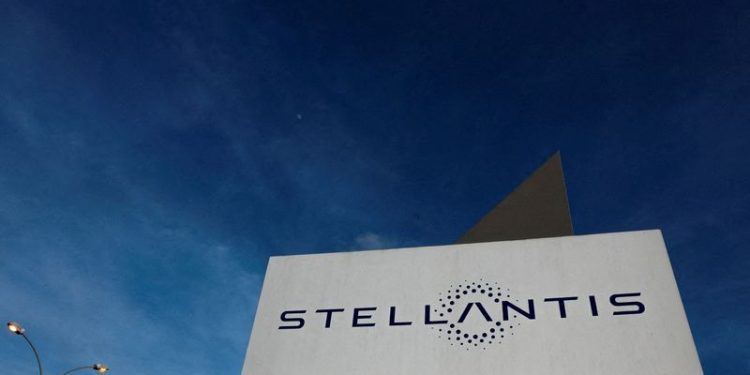By Nora Eckert
DETROIT (Reuters) – The United Auto Workers union is eying multiple U.S. strikes against French-Italian carmaker Stellantis (NYSE:STLA) about a year after a national walkout cost the Detroit Three automakers billions of dollars and idled 50,000 workers.
Accusing Stellantis of breaking its contract promises, UAW President Shawn Fain on Tuesday night warned that several union local chapters were laying the groundwork for strikes that could collectively shut down the automaker.
The latest UAW threats follow last year’s six-week strike that cost Stellantis about 750 million euros ($834.08 million) in profit. The union also hit General Motors (NYSE:GM) and Ford (NYSE:F) during the historic 2023 walkout, and drew U.S. President Joe Biden to the picket line to show his support for the striking workers.
Stellantis’ North American operations have been struggling, and the strike threat looms as the race for the White House between Democrat Kamala Harris and Republican Donald Trump heats up. Harris, who is currently the U.S. vice president, has been endorsed by the UAW.
Union strikes outside the four-year contract negotiations are unusual, and a large walkout at Stellantis just one year after its labor deal was penned, in an election year, would be unprecedented.
“The union has picked the perfect time to target Stellantis, because the North American group is likely at its weakest point,” said Sam Fiorani, vice president at research firm AutoForecast Solutions.
Fain said on Tuesday that 28 locals, covering tens of thousands of workers, had filed grievances against Jeep parent Stellantis and that 18 were at or near the point where they could call for strike authorization votes – with at least one expected in the next few days. Fain, who rose through the union’s ranks after working as an electrician for Chrysler, brought a more combative approach and a fresh leadership team to the union after his election in 2023.
The location and timing of the first strike authorization vote is still uncertain, but locals that filed grievances last month included plants in Toledo, Ohio; Kokomo, Indiana, and several in Michigan. The UAW has said roughly 98% of Stellantis’ membership is covered through those grievances, making the potential strikes as powerful as a nationwide walkout.
Stellantis could not be reached to comment on Wednesday, but said after Fain’s warning the previous day that the union leader had not offered any data or information to support his claims.
“(Fain) continues to willfully damage the reputation of the company with his public attacks which is helpful to no one including his members,” Stellantis said in a statement. “We would all be better served if these issues were addressed across the table with productive, respectful and forward-looking dialogue. A strike does not benefit anyone.”
The UAW’s grievances center around product and investment commitments made during the contract negotiations last autumn. Delays of a planned multibillion-dollar investment into a new battery plant and factory in Belvidere, Illinois, and possible plans by Stellantis to move production of the Dodge Durango SUV out of the U.S. have emerged as main sticking points for the UAW.
Stellantis said it has not confirmed plans to move the Durango. The contract signed between the UAW and the automaker allows the company to delay financial commitments if market conditions worsen.
TROUBLES IN U.S. MARKET
Stellantis’ U.S. business has faltered over the past year, and dealers and shareholders have publicly called out its lagging sales, bloated inventories and tumbling share price.
CEO Carlos Tavares has said he is focused on improving Stellantis’ performance in the U.S., and stated a willingness to shut down brands globally if they do not make money. Last month, he visited the U.S. with the intention of developing a plan to improve the U.S. operations.
Still, the automaker’s U.S. vehicle inventories are larger than those of a year ago before the strike, which could protect Stellantis from feeling any immediate pain if workers hit picket lines, analysts said. Its 77 days’ supply of vehicles at the end of August was up 18 days from the same time last year, according to industry firm Cox Automotive.
However, the UAW could target plants that make higher-demand vehicles, like Jeep SUVs, Fiorani said. A more targeted approach would allow the UAW to spend less money supporting striking workers.
A new collective strike now would capture the attention of the White House in the run-up to the Nov. 5 U.S. election. Michigan is a battleground state, which both Harris and Trump have visited several times.
Officials with the Harris and Trump campaigns could not immediately be reached for comment.
Harris has the backing of many unions as she seeks to attract support from more working class voters. Trump has said Fain is costing union members their jobs as the industry ships production outside of the U.S. and loses ground to China.
The executive board for the Teamsters is meeting on Wednesday as the union decides whom to endorse.
Fain said the UAW in last year’s deal won the right to strike over product and financial commitments. However, that could be tested in court, said Art Wheaton, labor professor at Cornell University.
According to union procedures, Stellantis has several opportunities to respond to the UAW’s grievances. If issues go unresolved, the union has 60 days to hold a vote on whether to strike. A strike authorization does not necessarily mean a strike will occur.
($1 = 0.8992 euro)





